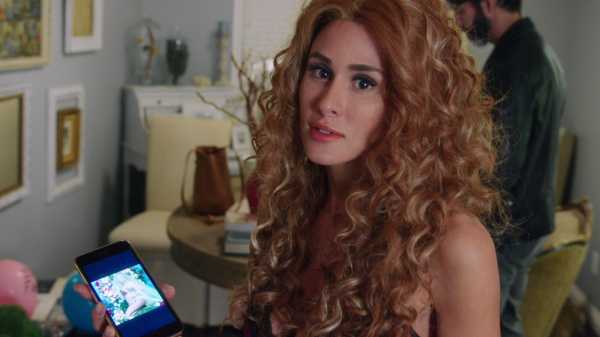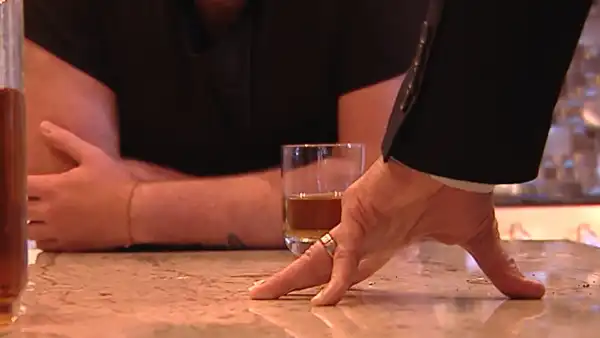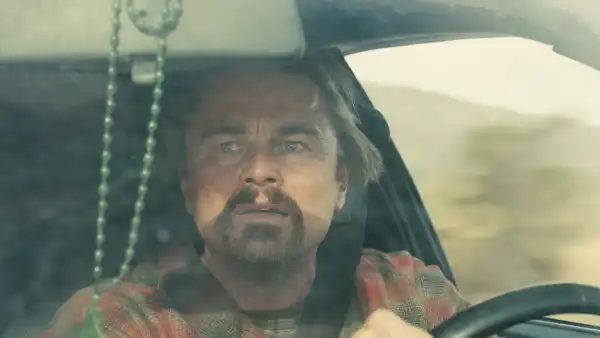
The new Netflix documentary “The American Meme,” directed by Bert Marcus, offers a chilling glimpse into the lives of social-media influencers, tracking their paths to online celebrity, their attempts to keep it, and their fear of losing it. Early on in the film, the pillowy-lipped model Emily Ratajkowski (twenty million Instagram followers and counting), who first became a viral sensation when, in 2013, she appeared bare-breasted in Robin Thicke’s “Blurred Lines” video, attempts to address a popular complaint raised against social-media celebrities. “There’s the attention argument,” she says, as images of her posing in lingerie and swimwear appear on the screen. “That we’re doing it just for attention . . . And I say, what’s wrong with attention?” “The American Meme” can be seen, at least partly, as a response to Ratajkowski’s question. It’s true that the model, with her superior bone structure, lush curves, and preternatural knack for packaging her God-given gifts into an enticingly consistent product, is presented to us in the limited capacity of a talking head, and so the illusion of a perfect influencer life—in which attention is easily attracted and never worried over—can be kept. (“Privacy is dead now,” Ratajkowski says, with the offhanded flippancy of someone who is only profiting from this new reality. “Get over it.”) But what is fascinating, and valuable, about “The American Meme” is its ability to reveal the desperation, loneliness, and sheer Sisyphean tedium of ceaselessly chasing what will most likely end up being an ever-diminishing share of the online-attention economy.
Social-media megastars like Ratajkowski, the producer and entrepreneur DJ Khaled, and the model Hailey Baldwin offer some commentary throughout “The American Meme,” but the film’s real focus is on tracking the struggles and triumphs of somewhat less established influencers. Brittany Furlan is an aspiring actress from small-town Pennsylvania who moved to Los Angeles and found viral success by making comedic clips on the now defunct short-video app Vine. Early in the film, Furlan is shown slathering on her makeup (“I hate my nose. . . . Everybody has their little tricks”) in preparation for an Instagram shoot at her apartment. The phrase “2017 is your year” is written, hopefully, on her bathroom mirror in red lipstick. For the shoot, a parody of Beyoncé’s Instagram announcement of her latest pregnancy, Furlan moves her couch out of the way to reveal a slightly chipped brown wall, against which she poses. She sticks her stomach out, wearing a wig of long ringlets, her lingerie-clad body wrapped in a patch of blue tulle, as she gazes lovingly—in a spoofy twist—at a large burrito. Once she posts the completed picture to her Instagram account, the tension in the room is thick. Implicit is the knowledge that the more likes she gets, the more famous she’ll become, and the more money she can make by promoting brands on her feed. In the post-posting moment, everything appears to hang in the balance. It is both completely mundane and completely terrifying. “How many likes do you have?” the photographer asks. “About two thousand, in three minutes,” Furlan says, worried. She clicks over to the page of another influencer named Josh Ostrovsky (a.k.a. the Fat Jew), a rotund jokester with an oversized chai necklace who has, of course, also posed as a disrobed, pregnant Beyoncé. “He’s going to dominate me,” she groans. “I’ll never be that popular!”
The notion of domination is crucial in social-influencer discourse. Another online celebrity the film follows is Kirill Bichutsky, a night-life photographer who has become known for posting vulgar “Girls Gone Wild”-style pictures on his Instagram account, @slutwhisperer. As part of his shtick, he arrives at his nightly club appearances dressed in fuzzy cow-printed onesie pajamas, complete with a horned hood, and blesses inebriated topless girls with what he calls “champagne facials.” Bichutsky thinks that, in a saturated social-media landscape, only the best influencers rise to the top, and his idiom is distressingly Darwinistic. “I believe in natural selection,” he explains. “Nature weeds out the weak. My job is to make you fall in love with me.” At one point, he adds, “Just because we’re at the top of the food chain doesn’t mean we’re not animals.” DJ Khaled, too, sees the Internet as a battleground. Khaled rose to enormous fame as one of Snapchat’s most popular users, documenting his life at every turn—including the actual birth of his son—and endlessly promoting products, with the help of catchphrases such as “We the best,” “Bless up,” and “Another one.” (“ ‘We the best’ is not just a cool thing to say; it’s a life style,” he explains.) “Everything I do, whatever it takes to survive,” he says. “I’m like a lion in the jungle.”
Khaled, his neck weighted with ropes of gold and diamonds, is one of the lucky predators of the particular jungle we’re living in, but Bichutsky isn’t so sure whether he’s going to maintain his own alpha position. “I’m not going to last another year,” he moans, admitting that he’s been losing followers, and that “everyone gets old and ugly one day.” Even when you’re a success, like Khaled, the hustle is grindingly boring: most of it, in the end, consists of capturing Snaps of things like your tater-tot lunch as you shout, “We the best.” And, clearly, not everyone is as blessed as the social-media impresario. During one montage, viral figures like the “Damn, Daniel” boy, “Salt Bae,” and “Chewbacca Mask Lady” populate the screen, and Ratajkowski muses on these flash-in-the-pan meme sensations: “In three or four days, does anyone remember who that person is? I don’t know.”
The idea of achieving some sort of longevity, or at least managing to cash in on one’s viral hit, is one that preoccupies the influencers featured in “The American Meme.” “I’m thirty; pray for me,” Furlan mutters, dryly, from her spot posing on her bare living-room floor. In that sense, Paris Hilton, an executive producer of the film and also one of its subjects, is the model everyone is looking to. Hilton has managed to continue playing the game by solidifying her brand—that of a ditsy, sexy, spoiled heiress. Rather than promoting others’ products, like most influencers, she has yoked her fame to merchandise of her own: a best-selling perfume line, pet products, clothes, a lucrative d.j. career, and on and on.
“Paris is a straight-up fucking icon,” the Fat Jew says grandly. “She set up the precedent for everyone to exist in the Internet-driven world.” He takes inspiration from her. After being accused of plagiarizing competitors’ accounts (a practice that he attempts to defend, rather weakly, as content curation), he decides that he would rather create something more lasting than memes. He now has a wine company, which began as an Internet joke and has since become the purveyor of America’s best-selling canned rosé. “I’m telling you, the age of the digital influencer, it’s gonna fucking crash,” he says. “I had to create something that I’d be able to walk away with.” Hilton, the O.G. Internet meme, whose catchphrase “That’s hot,” was the “We the best” of the mid-two-thousands, is also well aware that the public can turn against you on a dime. (She tearfully recounts how she was shamed for a sex tape that leaked in 2005.) She also describes how the collapsing boundary between person and commodity can be pernicious. “I’ve been a twenty-one-year-old for the past two decades,” she says. “It’s all part of an image and a brand and being a product. It’s like Groundhog Day. Everything I do is just the same shit, different day.” And yet she’s persevered. “I’ve definitely felt broken in my life, but I always come back with resilience,” she says with a smile. “I’m a strong girl . . . woman.” Conceivably, the payday has been worth it.
Watching “The American Meme,” I found myself thinking of Sydney Pollack’s 1969 movie, “They Shoot Horses, Don’t They,” which portrays a rigged Depression-era dance marathon taking place near L.A. in the course of weeks. The destitute competitors, drawing on their increasingly deteriorating physical and psychological resilience, are desperate to win the purse, and abandon dancing to begin racing against one another in a series of derbies of “energy and endurance.” A sadistic m.c. urges them to keep going “over broken bodies and broken dreams,” for the entertainment of intermittently cheering and jeering spectators. “Believe me, these wonderful kids deserve your cheers,” the m.c. shouts, as the competitors stumble below him. “Because each one of them is fighting down pain, exhaustion, weariness, struggling to keep going, battling to win.” His voice rises to hoarse scream. “And isn’t that the American way?”
Sourse: newyorker.com






